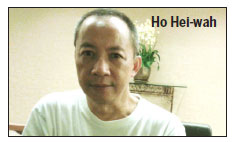Task force member calls for wide effort to beat poverty
Updated: 2012-09-01 07:06
By Joseph Li(HK Edition)
|
|||||||

The Chief Executive is moving at breakneck speed to try to ease the city's most pressing problems of poverty compounded by a widening wealth gap, says Ho Hei-wah, a member of the Preparatory Task Force on the Commission on Poverty.
"With the number of poor people rising and their income dropping, CY Leung believes this is injustice and a social problem of overwhelming magnitude. He sees that there is a pressing need for re-distribution of wealth, while former Chief Executive Donald Tsang, who dissolved the Commission in 2007, called poverty an inevitable result of capitalism," Ho told China Daily in an interview
The Commission on Poverty, to be re-convened in October, reflects the spirit of civic engagement, that characterizes the new administration, said Ho, who is also director of the Society for Community Organizations. He adds that in a break with the past, the solution is not a question of what the government believes, but a community effort. Opinions and suggestions must be collected from all sides, with a view to understanding the poverty situation and then finding the solutions.
"Chief Executive Leung re-launched the Commission on Poverty, hoping to provide basic protection and beyond that, a chance for upward mobility in the community," Ho said.

Leung is most eager to help those underprivileged people who are not covered by the social safety net, said Ho, who arranged for the CE to visit people in Hong Kong's neighborhoods to get closer to the grassroots during the election campaign.
Ho also said conditions are exacerbated for some working poor, low income people, because of the complex, inconvenient procedures involved in applying for social security.
Some people who would be eligible to receive support, simply don't bother to apply.
"The existing social services are rather isolated," he commented.
For example, the Social Welfare Department releases social security allowance if it finds a person eligible, but it will not help people to find jobs or assist people in other ways to free themselves from poverty. Similarly, the Labour Department helps people to find jobs but nothing else.
The existing procedures, he elaborated, are not user-friendly. For example, there are different rules governing social security, medical and textbook allowances, etc, while applicants have to go to different government departments.
"Chief Secretary for Administration Carrie Lam, who leads the task force, is exploring ways to streamline the procedures and provide one-stop service to applicants," he disclosed. "To identify these people, a 'poverty line' may perhaps be drawn to qualify people earning below a certain amount to obtain the allowances."
Ho also said the new Commission on Poverty a very high-profile and high-powered orgnization. Not only it is chaired by the Chief Executive himself, it comprises the chief secretary, financial secretary and six principal officials covering the education, labor and welfare, transport and housing portfolios.
Once it has reached policy decisions, those decisions will be implemented by the subordinate Executive Committee headed by the chief secretary.
"The commission is like a mini-Executive Council that makes major decisions," he commented, "while the Executive Committee handles inter-department barriers and removes the red tape."
Also, Ho hailed the engagement of the business community in the preparation of the commission.
"The involvement of New World Holdings Chairman Henry Cheng provides plenty of opportunities for the working people, because family-friendly policies such as baby-sitting services for female staff and flextime can not be done without the support of employers.
"Take traffic allowances for example, Cheng (whose group owns two bus companies serving Hong Kong Island) says that will not affect his business because buses need to be on the road with or without allowances."
joseph@chinadailyhk.com
(HK Edition 09/01/2012 page1)